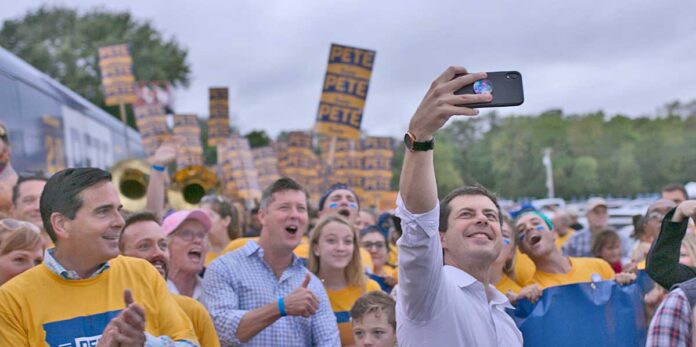The inspirational new documentary, “Mayor Pete,” available November 12 on Amazon, charts the political aspirations of South Bend, Indiana mayor Pete Buttigieg and his campaign to become President. The film combines interviews with Buttigieg, with news clips and verité behind-the-scenes moments — from Buttigieg rehearsing for debates to getting stuck in an elevator with his staffers. The documentary also focuses on Buttigieg’s sexuality, which is frequently a topic on the campaign trail; he spins being gay to emphasize a feeling of belonging and inclusion. In addition, there are several insightful scenes featuring the candidate’s husband, Chasten Buttigieg, such as one with gay teens.
Even though viewers know how “Mayor Pete” ends, the film will deliver the feels because Buttigieg is such a calm, rational center in the midst of an audacious campaign. Director Jesse Moss’ film may feel hagiographic at times, but it does address issues of race and privilege that dogged Buttigieg’s campaign (as well as his time as mayor). Moss chatted with PGN about his new film and Buttigieg.
What prompted you to make this documentary? I’m guessing you couldn’t have known the outcome when you started filming?
That’s what I love about unscripted, verité film. You just never know where it’s going to take you. Pete was intriguing to me. I didn’t think I’d make a film — or should make a film about him. My producers reached out asked if I was paying attention. And I said, “Not interested. No.” [Laughs] They said, “We might have access to his campaign. And check out this Town Hall!” I watched that and there was something interesting going on here — his message, his fluency, his facility on his feet. I connected with what he said, but I wasn’t a Pete supporter. But I liked the idea of access to a presidential candidate, as much as a longshot as he appeared to be. If he’s going to let us in, we can see a presidential campaign from the candidate’s point of view that could be a really interesting story. I thought to myself he would flame out in a matter of months and this would go nowhere? But let’s try it. We had to anticipate the likely outcome would be that he would not be the nominee for President. He got traction quickly, and it got exciting as he was moving faster and faster. Holding on to this streaking comet was hard.
Mayor Pete is almost always the kindest, smartest, and calmest man in the room. You capture Pete’s star power. What observations do you have about his character, his emotions, and how he changed and what he learned over the course of the campaign?
The film shows Pete as human. He has great gifts, and in some ways, he’s superhuman, but you see his vulnerability and his weaknesses, politically and personally. His campaign advisors are pushing him to be more and more emotionally expressive. Pete is hard to get to know, and a challenge is to get close to Pete when he’s asked a lot of by many people. The secret weapon was Chasten. Meeting him, and seeing how different they were, unlocked the story. I would have given up if I hadn’t connected with Chasten. I was able to see more of Pete through Chasten’s eyes and their relationship.
I like that you showcase Pete’s sexuality, but your film suggests it often defines him and his campaign, (and some of the backlash he faced from the religious right). Can you talk about that focus in the film?
A lot of the film lives in their relationship. There are aspects to their relationship that are true for a straight couple, but it is also true to them. They are in love with each other, and go on dates to Dairy Queen, but there are aspects that they are this millennial gay married couple on the biggest public stage imaginable. They are living their identities publicly and also navigating them privately in their relationship. And you see that in all sorts of different ways and in different scenes. Chasten talking about the fact that Pete was not running to be President of gay America, he was running as an out gay man. But there was a lot more to Pete and his candidacy. Pete says his identity was everything to some people and to others, it was a minor detail. Navigating all of those questions both publicly and privately was where the film came alive for me.
Pete’s message which resonated with me personally — that the campaign was defined for him as about belonging, creating a space for people who felt they didn’t have a voice, or a place in the national political conversation. I wanted to find that voice, whether it was in the form of Pete, or Chasten who, as a spouse, is a representative of the candidate and the campaign. I love that they were both defining and refining those roles and doing it together in harmony or in conflict as when Chasten says “Are you going to have me up on stage like other spouses in Iowa?” It’s not always smooth sailing; no relationship is. But in this couple, one of the parties is running for President.
